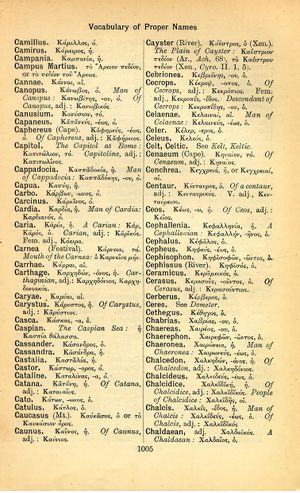Celeus: Difference between revisions
From LSJ
νύμφην τ' ἄνυμφον παρθένον τ' ἀπάρθενον → wife unwed and virgin that is no virgin | bride that is no bride, virgin that is virgin no more | virgin wife and widowed maid | unwed bride and ravished virgin
m (Text replacement - "link={{" to "link={{") |
m (Text replacement - "}}]]" to "}}]]") |
||
| Line 1: | Line 1: | ||
{{WoodhouseENELnames | {{WoodhouseENELnames | ||
|Text=[[File:woodhouse_1005.jpg|thumb | |Text=[[File:woodhouse_1005.jpg|thumb | ||
|link={{filepath:woodhouse_1005.jpg | |link={{filepath:woodhouse_1005.jpg}}]]Κελεός, ὁ. | ||
}} | }} | ||
{{Lewis | {{Lewis | ||
Revision as of 10:10, 15 August 2017
English > Greek (Woodhouse)
Κελεός, ὁ.
Latin > English (Lewis & Short)
Cĕlĕus: ĕi, m., = Κελεός,
I a king in Eleusis, father of Triptolemus. He or his son was taught agriculture by Ceres, whom he entertained as a guest, Hyg. Fab. 147; Ov. F. 4, 508; Verg. G. 1, 165 Serv. et Philarg.
Latin > French (Gaffiot 2016)
Cĕlĕus,¹⁵ ī, m. (Κελεός), Célée, [roi d’Éleusis] : Virg. G. 1, 165.
Latin > German (Georges)
Celeus, ī, m. (Κελεός, οῦ), König u. Cerespriester in Eleusis, den od. dessen Sohn die gastfreundlich aufgenommene Ceres den Ackerbau u. die Mysterien (ihren Geheimdienst) lehrte, Verg. georg. 1, 165. Ov. fast. 4, 507 sq.; vgl. Hyg. fab. 147.

